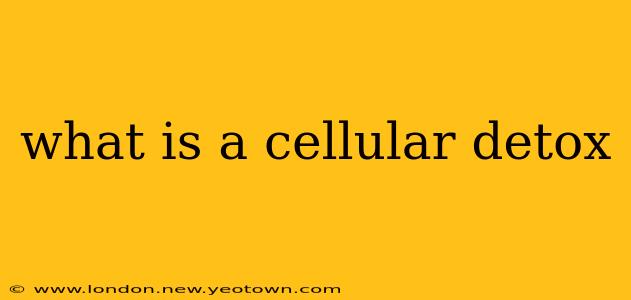The human body is a remarkable machine, constantly working to maintain balance and eliminate waste. But what happens when the waste accumulates faster than the body can process it? This is where the concept of a "cellular detox" comes in. It's not a magical cure-all, but rather a holistic approach to supporting your body's natural detoxification processes at a cellular level. Think of it as a deep spring cleaning for your cells, helping them function optimally.
Unlike the quick-fix detoxes you see advertised, a cellular detox isn't a crash course. Instead, it's a long-term commitment to lifestyle changes that promote cellular health and efficiency. It’s about empowering your body's inherent ability to cleanse itself. This journey involves understanding how your cells work, identifying potential roadblocks to their optimal function, and implementing strategies to overcome them.
What are the main organs involved in cellular detoxification?
Our bodies have several key organs that are crucial players in the detoxification process. They work tirelessly, often unnoticed, to filter out harmful substances and waste products from our cells and bloodstream. These include:
- Liver: This powerhouse organ is the primary detoxification center, processing toxins and converting them into less harmful substances that can be easily excreted.
- Kidneys: These filtration systems remove waste products from the blood, producing urine to eliminate toxins from the body.
- Skin: Sweat glands help eliminate toxins through perspiration. Think of a good sweat after a workout—it's your body's way of releasing some built-up waste.
- Lungs: Breathing helps expel carbon dioxide and other volatile compounds from the body.
- Lymphatic System: This network of vessels and nodes helps remove waste products and cellular debris from the tissues.
What are the signs of cellular toxicity?
Recognizing the signs of cellular toxicity is crucial to understanding whether a cellular detox might benefit you. While some signs are subtle, others can be quite noticeable. These can include:
- Fatigue: Persistent tiredness, even after adequate sleep, might indicate that your cells are struggling to function efficiently due to accumulated toxins.
- Brain Fog: Difficulty concentrating, memory problems, or feeling mentally sluggish can be linked to cellular toxicity.
- Skin Problems: Acne, eczema, or other skin irritations can sometimes be a manifestation of the body's attempt to eliminate toxins through the skin.
- Digestive Issues: Bloating, constipation, or other digestive problems can indicate that your body is struggling to process and eliminate waste effectively.
- Headaches and Migraines: Frequent headaches could be connected to the buildup of toxins in the body.
- Hormonal Imbalances: Toxins can interfere with hormone production and function, leading to various symptoms.
What are some ways to support cellular detoxification?
Supporting cellular detoxification involves a multi-pronged approach that includes lifestyle modifications and dietary changes:
- Hydration: Drinking plenty of water is crucial for flushing out toxins. Aim for at least 8 glasses of water per day.
- Nutrient-Rich Diet: Focus on consuming whole, unprocessed foods rich in vitamins, minerals, and antioxidants. These nutrients provide the building blocks for cellular repair and detoxification. Incorporate foods like leafy greens, fruits, and vegetables.
- Regular Exercise: Physical activity boosts circulation and lymphatic drainage, aiding in the removal of waste products.
- Adequate Sleep: Sleep is crucial for cellular repair and detoxification. Aim for 7-9 hours of quality sleep each night.
- Stress Management: Chronic stress can negatively impact the body's ability to detoxify. Practice stress-reducing techniques such as meditation, yoga, or deep breathing exercises.
- Limit Exposure to Toxins: Reduce your exposure to environmental toxins whenever possible. This includes avoiding smoking, limiting alcohol consumption, and using non-toxic cleaning products.
Is cellular detoxification safe?
Generally, supporting your body’s natural detoxification processes is safe. However, it's essential to approach it with a balanced and holistic mindset. Radical or extreme detox methods can be harmful. It's always best to consult with a healthcare professional before starting any new detox program, especially if you have underlying health conditions. They can help you determine what’s best for your individual needs.
Remember, a cellular detox is not a quick fix, but rather a journey toward a healthier you. By adopting sustainable lifestyle changes, you can support your body's natural ability to cleanse itself and achieve optimal cellular health.

